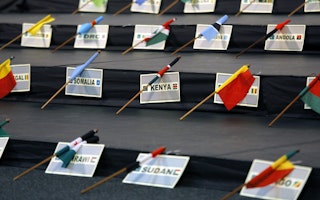West Africa’s “Promise Trackers” Hold Politicians to Their Word
By Catherine Kyenret Angai

“I believe that my only sin is talking too much before the elections, and I now have to pay the price.” That statement was made by Nigeria’s Minister of Information, Alhaji Lai Mohammed, during a town hall meeting organized by civil society. The meeting was part of an effort to ensure that democracy leads to good governance, and the minister’s statement exemplifies why campaign-promise tracking has become a key part of our effort to improve governance in West Africa.
In recent years, West Africa has made strides towards more peaceful elections and smooth transitions of power. In addition, social movements coupled with citizen engagement have contributed to the improvement of governance. Despite these positive achievements, however, the region’s challenges remain immense. Many countries continue to grapple with rising insecurity, unemployment, corruption, and worsening poverty, exacerbated by a political class that does not seem committed to upholding good governance. Five of the 12 poorest African countries are in West Africa, as are six of the ten countries with the lowest literacy rates in the world. Democracy has failed to deliver dividends, and many governments across the region have not been able to capitalize on democratic gains. Despite successive elections, democracy has failed to deliver on good governance.
Part of the reason for this is a failure of presidents to deliver on their campaign promises. Key among those promises are the development initiatives candidates say they will advance once elected. For instance, Senegalese President Macky Sall’s pledge to reduce the prices of basic goods such as rice, oil, cooking gas, sugar, and milk by 50 percent. And Nigerian President Muhammadu Buhari’s commitment to creating three million jobs in a year. Both are examples of politicians habitually making promises without a clear strategy for how to achieve them.
Early engagement and effective interfacing between citizens and government are critical to understanding the development agendas of candidates and holding them to those agendas. To help achieve this, in 2012 the Open Society Initiative for West Africa launched a “promise tracker” initiative to monitor campaign vows and make the data available to citizens throughout the region.
When party manifestos lack clarity and precision, journalists play a key role in engaging and prodding candidates to elaborate on the specifics. This information is then fed into our tracking mechanism to monitor the progress made by the ruling party. Progress reports are issued regularly, including a user-friendly online version. In addition, regular town hall meetings are held with federal-level government officials, citizens, and other stakeholders, creating a space for people to provide feedback on various areas the government could improve on.
These tracking mechanisms are now up and running in several countries. The first tracker in the region was the Mackymetre in Senegal, to track the promises of President Macky Sall. This was followed by the Buharimeter in Nigeria for President Buhari and the Talonmetre in Benin for President Patrice Talon. There’s also the Presimetre in Burkina Faso and Lahidi in Guinea. Civil society in Niger is working to create a tracking tool there, as well. Though these tools are web-based, their utility depends on traditional methods of collecting information, with the help of engaged citizens at the grassroots level who monitor activities and projects implemented by government.
Tracking promises has become a viable way for citizens to hold government accountable. In Burkina Faso, the Presimetre initiative enabled citizens to engage with the president during an open forum organized to mark his hundredth day in office. Some political leaders have resisted participating—a testament to the tool’s effectiveness. In Nigeria, for instance, the 100 days report published by the Center for Democracy and Development was dismissed by the special advisor to the president on media as a “tool to score points” against the president. Despite this, the president sent five senior ministers to an open forum to make the case for the delivery of his promises.
Civic participation is key to achieving good governance and crucial for assessing the legitimacy of government. While some governments define civic participation as simply granting access to information, more of them now recognize the need for more transparency and the value of creating spaces for citizens to speak up. Free and fair elections are absolutely fundamental, but they need to be paired with a shift in approach that ensures that debates are issue-based, those elected are held to account, and citizens are equipped to make the right choices.
Catherine Kyenret Angai is the program and advocacy coordinator at the Open Society Initiative for West Africa.


